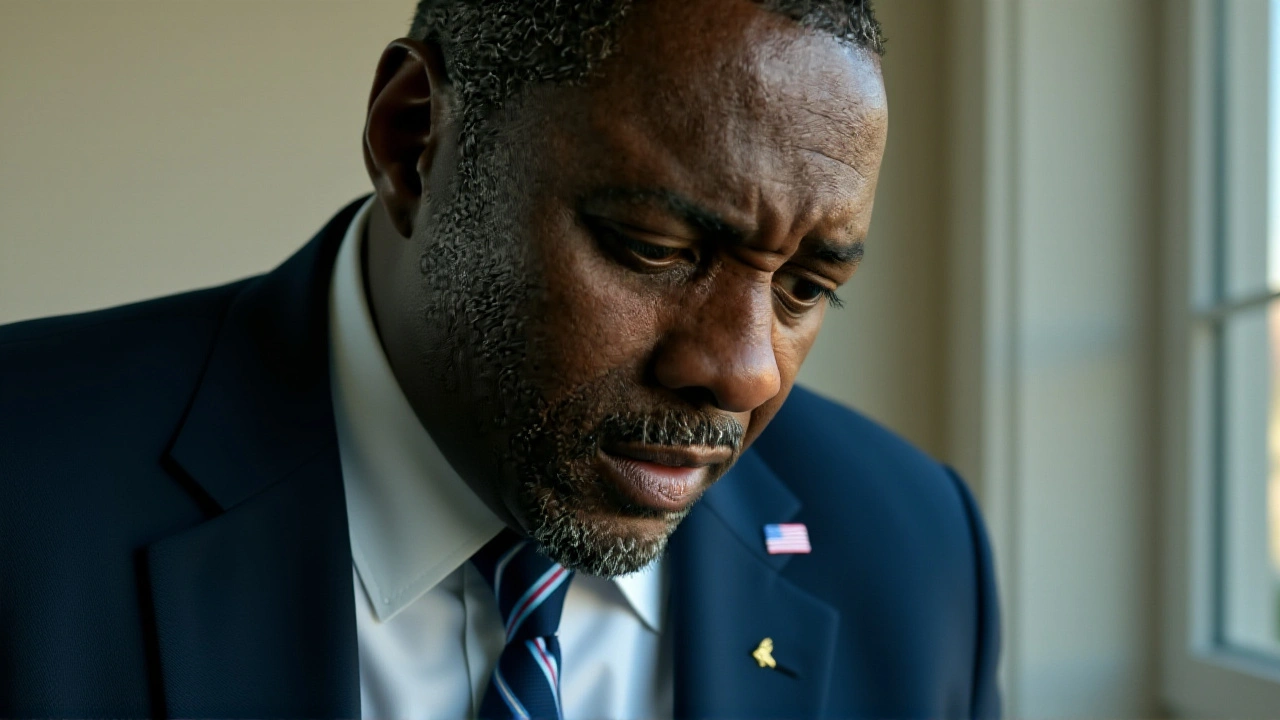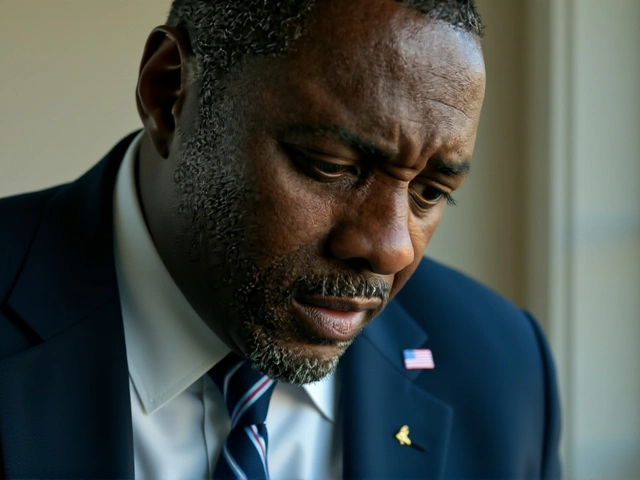When Kathryn Bigelow, the Academy‑Award‑winning director, confirmed at a press briefing on October 24, 2025, that her new political thriller A House of Dynamite will hit theaters later this year, the film world perked up. The movie, penned by veteran screenwriter Noah Oppenheim, assembles a roster of more than a hundred credited performers, making it one of the most densely populated ensembles in recent cinema. The production’s details, scraped from the official IMDb page on October 26, 2025, reveal a who's‑who of political‑drama talent, though the studio and budget remain under wraps.
Genesis and Creative Team
Bigelow, fresh off the critical success of "The Destroyer" (2023), said in the briefing that she was drawn to Oppenheim’s script because it “captures the tremor of power when the world feels like a ticking time‑bomb.” The writer, known for his work on the espionage series "Shadow Protocol," crafted a narrative that places the United States presidency at the center of an imminent crisis. While the film’s exact plot remains secret, the cast list suggests a story steeped in the corridors of the White House, Pentagon briefing rooms, and covert military installations.
Ensemble Cast Highlights
Leading the charge is Idris Elba, who steps into an unprecedented role as the President of the United States. Elba’s turn marks his first time portraying a sitting commander‑in‑chief, a challenge he described to a reporter on set as “a weight you can feel in your shoulders, even when you’re not wearing a suit.”
Opposite him, Rebecca Ferguson assumes the mantle of Captain Olivia Walker, a gritty Air Force officer who, according to Bigelow, “doesn’t just follow orders—she redefines them when the stakes soar.” Gabriel Basso, Jared Harris, Tracy Letts, Anthony Ramos, and Moses Ingram round out the senior government and military figures, each assigned a rank that mirrors real‑world positions—from Deputy National Security Advisor to Secretary of Defense.
Beyond the marquee names, the credit list includes a surprising array of roles: Kyle Allen as Captain Jon Zimmer, and Kaitlyn Dever as Caroline Baker, the First Lady’s younger sister—a subplot that hints at personal drama inside the Oval Office. Even the background talent is catalogued in painstaking detail, from secret service agents to FEMA employees, underscoring the production’s ambition to render a fully realized governmental ecosystem.
Production Details and Public Materials
The only visual teasers released so far are three official videos hosted on the film’s IMDb page: an opening trailer lasting 1 minute 57 seconds and two teasers each clocking in at 1 minute 17 seconds. Across the three clips, the cinematography leans heavily on stark, high‑contrast lighting—perhaps a nod to Bigelow’s signature style in "The Hurt Locker." In total, IMDb catalogues 33 still photographs, 27 of which are behind‑the‑scenes shots showcasing the elaborate set construction of a mock‑up of the White House West Wing.
Interestingly, the production’s location list is silent; no city or studio has been confirmed. That omission (and the lack of a disclosed budget) fuels speculation that the film could be leveraging virtual production technology, a trend that has taken hold since the pandemic. If true, the film might be joining the ranks of recent blockbusters that blend real sets with LED‑wall backdrops, a method Bigelow reportedly praised in a late‑2024 interview.

Industry Reaction and Anticipated Impact
Trade analysts at Variety estimate that a film featuring Elba and Ferguson could open to a domestic weekend gross of $45‑$55 million, assuming a standard wide release. The political‑thriller genre, after a lull following the 2022‑2023 wave of election‑cycle dramas, appears poised for a resurgence, especially as audiences crave narratives that mirror real‑world tension.
Film historian Dr. Lena Ortiz of Northwestern University noted, “Bigelow’s return to a governmental tableau after ‘Zero Dark Thirty’ invites a comparison: both films treat power as a volatile element—but ‘A House of Dynamite’ seems set to emphasize internal bureaucracy as much as external threat.” That observation dovetails with the film’s heavy ensemble, which could make it a benchmark for future multi‑character political epics.
Looking Ahead: Release Outlook
With a 2025 release year confirmed but no exact date announced, the studio (still unnamed) is likely to position the film for a summer or early‑fall slot, when audiences are primed for high‑stakes dramas. Marketing momentum is expected to build through additional trailers, a possible Cannes preview in May 2025, and a targeted social‑media campaign featuring behind‑the‑scenes clips of Elba in the Oval Office.
Should the film meet its projected box‑office expectations, it could not only cement Bigelow’s status as a master of tension but also invigorate a genre that has been waiting for a fresh, star‑driven entry. For now, fans and critics alike will keep an eye on the evolving promotional slate, waiting to see if the promise of a “house of dynamite” translates into an explosive cinematic experience.
Frequently Asked Questions
When is the official release date for A House of Dynamite?
The studio has only confirmed a 2025 release window. Industry insiders expect a summer or early‑fall opening, but a specific day has not been set as of October 26, 2025.
Which actors portray the highest‑ranking officials in the film?
Idris Elba plays the President, Jared Harris is the Secretary of Defense, and Rebecca Ferguson appears as Captain Olivia Walker, a senior Air Force officer.
What kind of promotional material has been released so far?
Three official videos are live on IMDb: a full trailer (1:57) and two teasers (each 1:17). In addition, 33 still photographs—mostly set and behind‑the‑scenes shots—have been posted.
How does this film compare to Bigelow’s earlier political thrillers?
While "Zero Dark Thirty" focused on a single protagonist’s chase, "A House of Dynamite" embraces a sprawling ensemble, depicting the inner workings of multiple government branches. Critics expect the new film to expand Bigelow’s exploration of power dynamics.
What impact could the film have on the political‑thriller genre?
If the projected $45‑$55 million opening materializes, studios may green‑light more big‑budget, ensemble‑driven political dramas, reinvigorating a genre that has seen fewer marquee releases since the early 2020s.



Comments
Bigelow's new thriller is just a front for a massive goverment propoganda push, hidden behind the glitter of a star‑studded cast. The timing lines up too neatly with upcoming election cycles, which makes you wonder if there’s a hidden agenda. Even the choice of Idris Elba as President feels like a calculated move to attract a certain demographic, not just artistic merit. And the secrecy around the budget? Classic sign of a project backed by unseen forces. They’re probably using virtual production to control every visual element, turning reality into a crafted narrative that serves a purpose.
We’re finally seeing a rare chance for a Black actor to embody the President, and that feels huge for representation. It’s not just about the color of the suit; it’s about the power dynamics on screen. The role could bring a new perspective to the usual political drama tropes, and that’s something audiences have been craving. If Bigelow handles it with her trademark tension, we might get a performance that resonates beyond the box office. The ensemble also promises a layered look at how different branches of power interact, which could be fascinating.
Honestly the ensemble mirrors the overblown ambition of contemporary cinema, an attempt to cram narrative depth into a star‑studded roster. It’s a showcase of who can afford a cameo rather than a cohesive story. The sheer number of credited performers suggests a style that values quantity over quality. When you have a hundred names, the risk is that nobody gets a chance to truly develop.
The decision to build an entire governmental ecosystem on screen is bold, especially in an era where audiences are skeptical of political narratives. By placing the President, military, and civilian agencies together, the film could explore the friction points that are usually hidden from the public eye. Bigelow’s previous work shows she isn’t afraid to expose the grim realities behind power structures, so this project could be a natural progression. The inclusion of a First Lady’s sister as a subplot hints at personal dynamics that could humanize the high‑stakes environment. Moreover, the use of virtual production technology could allow for seamless transitions between the Oval Office and battlefield briefs, creating a visual language that underscores the narrative’s tension. The marketing strategy, with teasers focusing on stark lighting, suggests an intention to evoke the feeling of a ticking time‑bomb, aligning with the film’s title. If the budget indeed leans heavily on LED walls, we might see a new standard for political thrillers that blend realism with stylized visuals. The cast’s diversity is also noteworthy; having Idris Elba and Rebecca Ferguson leads a mixed‑gender, multi‑ethnic representation of authority. This could resonate with audiences seeking more inclusive storytelling. Critics have already speculated about the film’s potential box‑office impact, and a strong opening could revitalize the genre. The lack of a disclosed studio adds mystery, perhaps allowing the film to stand on its own merit without corporate expectations. The rumor that the script was tightened by several political consultants suggests a desire for authenticity, which could set it apart from more sensationalist entries. The presence of seasoned actors like Jared Harris and Anthony Ramos brings gravitas, ensuring that the dialogue feels grounded. Meanwhile, the behind‑the‑scenes photos give fans a glimpse of the massive set construction, a testament to the production’s ambition. If the narrative successfully balances macro political intrigue with intimate character moments, it could become a benchmark for future ensemble thrillers. Ultimately, the film’s success will hinge on whether it can turn its massive cast and high‑tech production into a coherent, suspense‑filled experience that keeps viewers on edge from start to finish.
The budget secrecy feels like a deliberate marketing ploy, doesn’t it?
A film that glorifies military and political power without questioning ethics is a dangerous narrative. It normalizes the idea that force and authority are inherently justified, which can influence public perception. When big‑budget movies paint such pictures without nuance, they risk becoming propaganda. Viewers deserve a story that interrogates the consequences of those decisions, not just celebrates them. Otherwise the cinematic experience becomes an echo chamber for the status quo.
Bigelow’s track record shows she never shies away from uncomfortable truths, yet this project may cross a line into blind hero worship. The risk is that the President character becomes an uncritical idol, sidelining the complex realities of governance. If the film leans too heavily on spectacle, it could sacrifice the critical edge that made her earlier work compelling. Audiences will be watching to see whether the narrative challenges power or simply dramatizes it.
The notion of a "house of dynamite" metaphorically captures the volatile equilibrium of power structures, a concept both timeless and timely. When each room represents a different branch of government, the slightest spark can set off an explosion that reverberates across society. Such a visual metaphor invites viewers to contemplate the fragility of democratic institutions. It also reminds us that behind the polished facade lies a network of tensions ready to erupt.
Let’s channel that energy into meaningful discussion about how cinema can reflect civic responsibility. By analyzing the film’s themes we can better understand the role of art in shaping public discourse. It’s an opportunity to encourage critical thinking rather than passive consumption.
Everyone’s hyped about Idris Elba as president, but I think the real fireworks will come from the supporting cast 😂.
True! The depth of the secondary characters will probably steal the show 😉.
What a fascinating blend of technology and storytelling!!! The virtual production angle could redefine big‑budget filmmaking!!! It’s exciting to imagine how LED walls can create immersive political environments without traditional sets!!! This could set a new standard for the genre!!!
Sure, because throwing LED walls at a political drama automatically makes it profound, right?